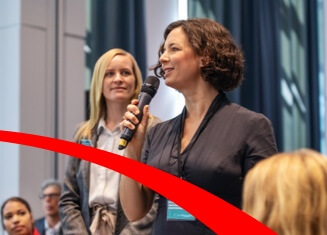

Annual Meeting American Academy of Allergy, Asthma and Immunology (AAAAI), 2026
Premier global educational event for allergists and immunologists, with thousands of attendees each year, discussing allergies, asthma, and immune deficiency disorders.
To report an adverse event or product quality complaint, call 1-877-TAKEDA-7 (1-877-825-3327)

Not an actual patient.
The actual prevalence remains unclear, but estimates range from 390,000 to 6 million people living with PID worldwide.4 In the U.S. alone, the prevalance is thought to be as high as 50.5 cases per 100,000 people.5 Although severe forms are more frequent in infancy and early childhood, the disease may not manifest until later in life in some cases.6
PIDs are broadly classified, but antibody deficiencies represent the most common form and are characterized by impaired antibody-producing components. In the U.S., antibody deficiencies account for more than half of all PID cases (63.4%).7 Due to their unique role in antibody production, defects in B cell development and function are the main cause of antibody deficiencies. However, defects in T cells and other immune cell types that contribute to B cell activity may also be present.8
PIDs are significantly underreported, and estimates suggest that 70-90% of patients are undiagnosed worldwide, largely because it is not top of mind.6 According to a U.S. survey, the average time from symptom onset to diagnosis of all types of PID was 25 years based on 977 respondents.9 Diagnosing an antibody production deficit relies on a thorough medical and family history, physical examination and should be supplemented with diagnostic screening tests (e.g. complete blood count with differential white blood cell count, serum antibody levels, vaccine response) to help identify specific PID types.1,6
The clinical presentation of PIDs is highly variable; however, recurrent sinopulmonary and gastrointestinal infections are particularly common.1,8,10,11 Therefore, the management approach is highly dependent on the type of defect and is largely focused on the prevention and treatment of infections, while more severe cases may require hematopoietic stem cell transplants.1,8 The mainstay treatment for primary B-cell immunodeficiencies, is replacement of serum IgG with either intravenous immunoglobulin (IVIG) or subcutaneous immunoglobulin (SCIG).1,7 If left untreated, PID can lead to hospitalizations, frequent days missed from work/school, prolonged antibiotic use, permanent organ damage or even death.10,12,13
This is not intended to be a comprehensive resource of all congresses and congress materials across therapeutic and disease areas. Congress materials may include information about investigational use(s) of compounds/products that are not approved for use by the U.S. Food and Drug Administration (FDA) and/or are inconsistent with the Prescribing Information. Takeda does not recommend the use of any Takeda product beyond the approved labeling. Any decisions regarding the usage of a Takeda product beyond the approved labeling are left to the discretion of the healthcare professional. Takeda makes no representations about whether investigational compounds or unapproved uses will be approved by the FDA.


Premier global educational event for allergists and immunologists, with thousands of attendees each year, discussing allergies, asthma, and immune deficiency disorders.


Each year, the American Academy of Neurology's Annual Meeting offers a robust lineup of diverse learning opportunities covering nearly every topic and subspecialty, helping you stay up to date on the latest trusted science and essential education.


Brings together home and alternate site infusion professionals for four days of networking, education, and exhibits. The expo features companies displaying the latest products and services supporting the industry.


Global meeting featuring thought leaders from around the world focused on advancing patient care in allergy and immunology.


Annual meeting dedicated to the advancement of neuromuscular, musculoskeletal, and electrodiagnostic medicine.


Annual event with more than 2,500 members and non-members of the AMCP to engage on the latest innovations and most intentional networking in managed care pharmacy.


National conference of IgNS bringing together professionals and practitioners from all disciplines and clinical specialties to advance Ig therapy practice, while providing networking and comprehensive education opportunities.


This event brings together over 1200 HAE community members, including families, caregivers, healthcare professionals, and pharmaceutical representatives.


Regional annual conference discussing the most current information from top experts in allergy, asthma, and immunology.


International conference showcasing the latest advances in pulmonary disease, critical illness, and sleep disorders for scientists and clinicians at all stages of their careers.


Annual meeting with the goal of providing a stimulating forum with presentations and discussions on the latest advances in clinical immunology, including primary immunodeficiencies and immune dysregulatory diseases.


Annual meeting in neurology promoting high quality patient-centric care in a variety of topics and specialties through various learning formats.


Large assembly of pharmacy and healthcare professionals dedicated to the issues of managed care pharmacy, offering immersive education sessions and keynote presentations.


Annual conference ideal for infusion professionals or those seeking opportunities in the industry to come together and explore the latest trends in offering home-based services.


Premier global educational event for allergists and immunologists, with thousands of attendees each year, discussing allergies, asthma, and immune deficiency disorders.


Annual scientific session uniting allergists, immunologists, nurses, and physician assistants aimed at maintaining the highest standard of practice in allergy care.
This resource provides information on Takeda medications available in the Primary Immunodeficiency Disease category and is not intended to represent a complete list of therapeutic options.
[Immune Globulin Subcutaneous (Human)] 20%
[Immune Globulin Infusion (Human)] 10%
[Immune Globulin Infusion (Human)] ≤2 μg/mL IgA in a 10% Solution
[Immune Globulin Intravenous (Human)] IgA less than 1 μg/mL in a 5% Solution
[Immune Globulin Infusion (Human), 10% with Recombinant Human Hyaluronidase]
Watch videos focused on Primary Immunodeficiency Disease [PID (IEI)].
Learn about the cause of Primary Immunodeficiency Disease (PID)/Inborn Errors of Immunity (IEI) in this animated video.
Find materials to help foster a deeper understanding of Primary Immunodeficiency Disease [PID (IEI)].
An overview of the overall health disparities and their impact on PID (IEI) patients.
An overview of PID (IEI) diagnosis including testing, impact of delayed diagnosis, and co-ordinating care.
An overview of PID (IEI) epidemiology, pathophysiology, signs and symptoms, and burden of disease.